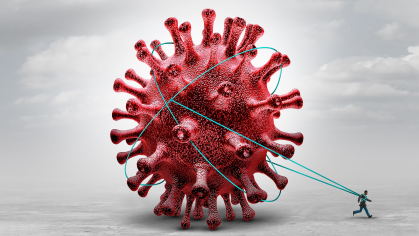Rutgers Reports First Instance of COVID-19 Triggering Recurrent Guillain-Barré Syndrome

Discovery provides new information on treating COVID-19 patients with autoimmune disorders that target the nerves
Researchers at Rutgers Robert Wood Johnson Medical School have reported the first instance of COVID-19 triggering a recurrence of Guillain–Barré Syndrome – a rare disorder where the body’s immune system attacks nerves and can lead to respiratory failure and death.
While there have been several reports of Guillain–Barré Syndrome following COVID-19, this is the first in which COVID-19 actually triggered a recurrence of the condition – in a 54-year-old man who had suffered with Guillain–Barré Syndrome twice and had a third occurrence after testing positive for COVID-19, according to the Rutgers case report published in the journal Pathogens.
“The patient came to the emergency room with complaints of progressive difficulty swallowing, then had a fever for three days, followed by weakness in the arms, legs and face,” said Erin McDonnell, a medical student who made the discovery. “His symptoms were worse this time than in previous episodes. He has since recovered.”
Researchers looked at about 1,200 hospital patients diagnosed with COVID-19 who were admitted and discharged between March and May of 2020 and this was the only instance where COVID-19 triggered the recurrence of Guillain–Barré Syndrome.
Guillain–Barré Syndrome can follow acute viral and bacterial infections, causing symptoms including weakness and tingling in the extremities. As the condition worsens, the weakness quickly spreads, eventually sometimes paralyzing the whole body. While most people recover from the condition, about 5 percent of people experience a recurrence, McDonnell said.
“We recommend that patients who develop COVID-19 and have a history of autoimmune [demyelinating] disorders in which the body’s immune system attacks the myelin that insulates and protects their nerves be closely observed for several weeks for neurologic symptoms,” said Payal Parikh, assistant professor at Rutgers Robert Wood Johnson Medical School, who led the study along with Martin Blaser, director of the Center for Advanced Biotechnology and Medicine and professor at Rutgers Robert Wood Johnson Medical School.
The findings will improve the understanding of the spectrum of Guillain–Barré Syndrome, which may be trigged by acute viral or bacterial infection, and help create treatments for COVID-19 patients.
Other Rutgers authors included Nicole J. Altomare, Yesha H. Parekh, Ram C. Gowda and Mark H. Lazar.
See how Rutgers is making a difference during the COVID-19 crisis.


